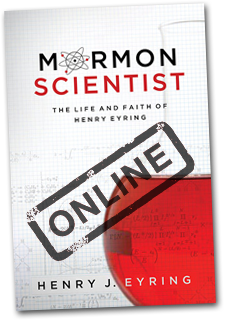Memories of Dr. Eyring
‹ previous | page four of six | next ›
-
Not without Honor
“A prophet is not without honor save in his own country and in his own house,” does not apply to Henry. When he retired as Dean at the University of Utah, all his 15 brothers and sisters, their spouses, and many of their children and their children’s children, making a group of more than 90, gathered in Salt Lake City to honor him. We had not all been together as a single family group in more than 40 years. It was an unselfconscious acknowledgement of his family’s affection.
One early morning several years ago we ran into each other on a back street in Atlantic City, neither suspecting that the other was in town, and had breakfast together. It pleased him to think that a Divine benevolence had caused our paths to cross. We differed in our belief concerning this, but I am grateful for the crossing of our lives and am content to leave this out of the realm of chance.
-
A Firm Mathematical Proof
I fondly remember a number of humorous experiences with Henry. One of the most vivid is an incident in a statistical mechanics class. He was busy deriving a partition function which had in the denominator N! I questioned the reasoning behind incorporation of N!, whereupon Henry patiently went through the derivation again. I still was not satisfied and responded with, “intuitively, it does not make sense.” Henry, with all the patience he could muster, turned to me and said: “John, N! needs to be there, and I’m going to tell you five more times. That will constitute a proof.”
-
“Little Fellows”
New graduate students in chemistry at Princeton 30 years ago soon came to accept the fact that Henry Eyring could see molecules. Henry spent eight to ten hours a day in his office talking with students and co-workers. After about an hour with him one would emerge into a new world in which the “little fellows,” John and Joe and Sam, as Henry called them by name, were still dancing about in the friendliest way imaginable. Thus Henry showed how the ornery behavior of complex systems could often be tamed by a kindly approach to the molecules. With blackboard, chalk, and a relentless discussion, many mysteries were unraveled.
-
“I’ll Give You an Answer”
My first meeting with Henry Eyring occurred at Princeton University while I was a graduate student at Harvard. I had made a trip to Princeton to attend a seminar being given by one of my former teachers and was graciously invited to join some of the faculty and the speaker at dinner and discussion in the Graduate House after the seminar. I recall how impressed I was to be sitting at dinner between Dr. (later Sir) Hugh Taylor and Dr. Henry Eyring. I was fascinated with wit, charm, and scientific acumen of Dr. Eyring.
After dinner we sat about and discussed scientific questions, largely arising from the seminar. In the course of this discussion Henry made the comment, “Give me some paper and pencils and I’ll give you an answer to any question you pose. It may not mean anything much, it may even be wrong, but I’ll give you an answer.” I was greatly intrigued by this statement. To me it indicated Henry Eyring’s interest in all matters of science, his confidence, yet humbleness, in his own capability, and a delightful sense of humor which permitted him to poke fun at himself.
-
Honoring George Washington
Because Henry traveled on a number of occasions during the school year, it was necessary to make up some missed class work in his statistical mechanics course. Several two-hour sessions were scheduled, and one of them was to be on Washington’s Birthday, which was a university holiday. Perhaps to justify this action, he said that we could better honor George Washington by being at school studying and working than to take the day off. As a result, we honored George Washington that year as we devoted ourselves to higher things.
-
A Lack of Timidity
His generosity with good-humored free advice to his colleagues and even casual acquaintances is well known, perhaps even legendary. It was he who counseled that I do a year of post-doctoral work (1960-1961) in Eigen’s Goettingen laboratory. This suggestion was very timely, and my exposure to Manfred Eigen, the disciplined perfectionist, provided an interesting contrast to Henry Eyring, the buoyantly optimistic, free-wheeling generalist. Qualities I particularly admire in Henry Eyring’s style of doing science are his complete lack of timidity in his choice of problems and his taboo against speaking critically in a personal way of the more modest achievements of others.
-
A Teacher and Missionary
Professor Eyring had the qualities of a great teacher and missionary in that he attempted to reach and meet the soul and mind of every student he encountered. In my encounter with him 25 years ago he was not deterred by differences in religious and political viewpoints but strove to transmit to me his own understanding of all issue, scientific and otherwise. Even though I have not come to agree with him on all matters, I have moved very much toward his position on some, based on the life experience of 25 more years. What I can never forget was his concern for each individual, his attempts to join us to him in good fellowship, moral elevation, and inspirational thinking.
‹ previous | page four of six | next ›
